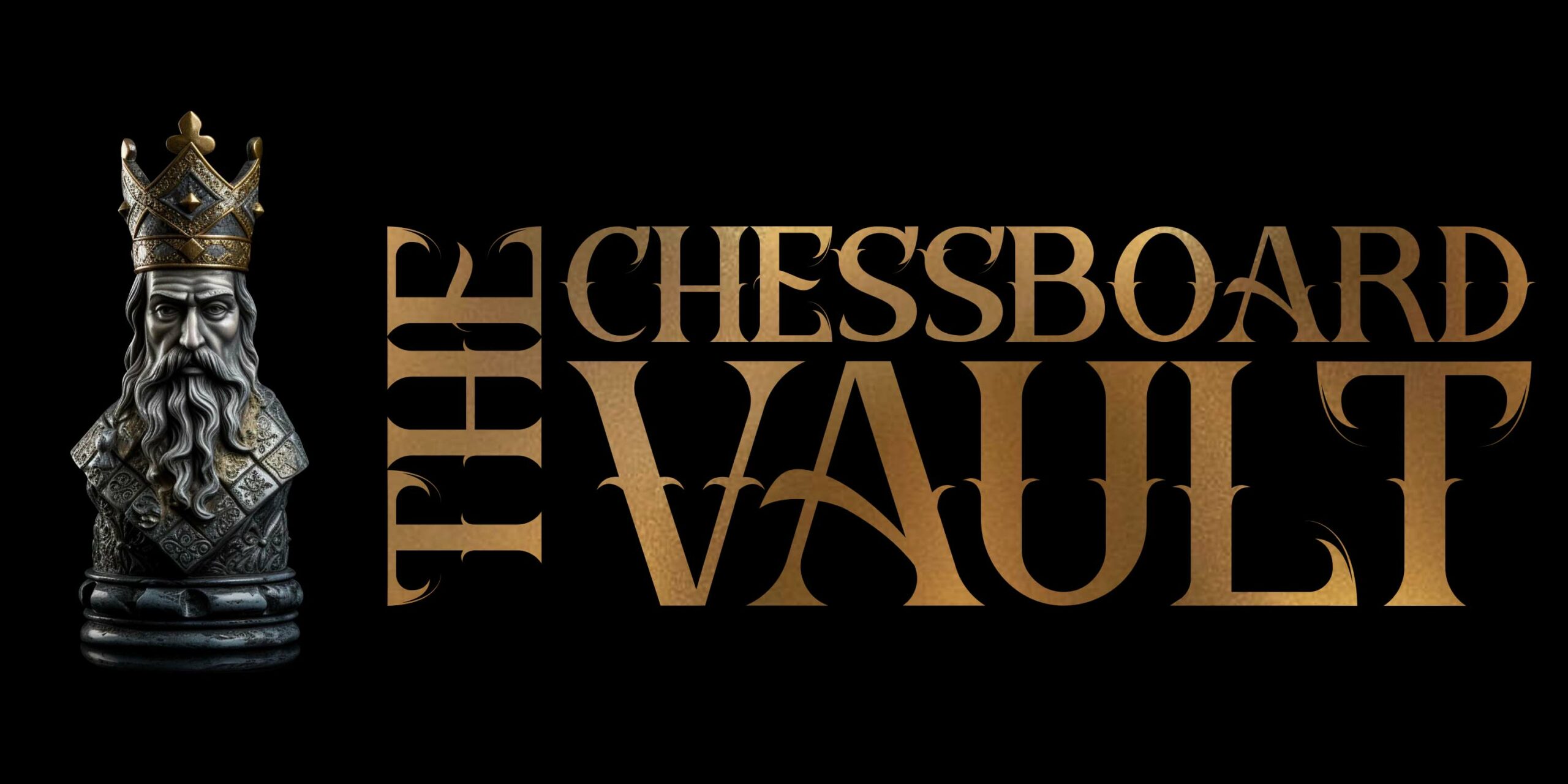The day Switzerland showed its love for chess: FIDE100 torch ceremony in Bern
In a series of vibrant events involving Swiss chess players, children, politicians, civil servants and people from all walks of life, Switzerland celebrated FIDE’s 100th anniversary with elegance and enthusiasm, staying true to the spirit of the game and its universal appeal.
Switzerland is a country with an important chess history. As the official headquarters of FIDE (located in Lausanne), it occupies a prestigious position in the chess world. What’s more, FIDE’s first treasurer was Swiss, and the Swiss Chess Federation (FSE), founded 135 years ago, predates FIDE itself. Switzerland has hosted two Chess Olympiads (1968 and 1982), a World Championship match (2004) and numerous other events. important chess tournaments. It hosted the great Viktor Korchnoi and is also known for its “Swiss system” tournament format.
For the first time in the capital’s history, an Olympic-style ceremony took place in Berne – when FIDE President Arkady Dvorkovich carried the torch that lit the flame to the Bundesplatz, the city’s central square, in front of the Parliament building – the seat of political power in Switzerland.
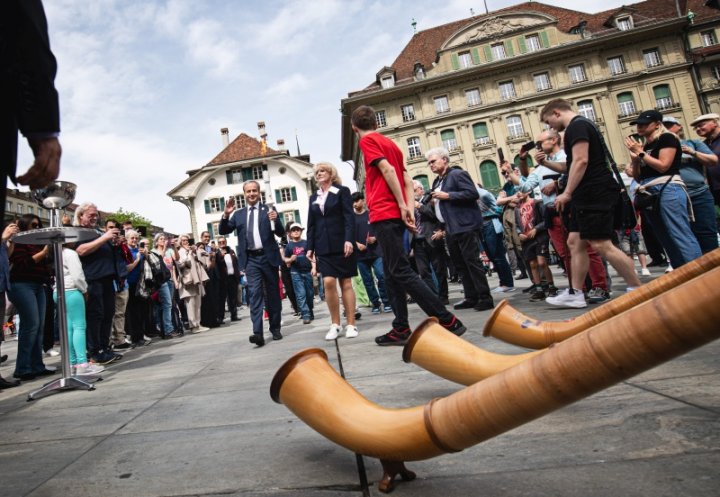
To the low, melodious sound of the alphorn, as if announcing the descent of the Caissa mountains, the torch was carried through the center of Berne, before the astonished spectators.
Arkady Dvorkovich thanked Berne, the ESF, Swiss officials and all chess enthusiasts for coming to contribute to the celebration. He declared:
We really feel at home in Switzerland, and we hope this event will help to interest and involve more people in chess.
The flame ceremony was the starting point for several special events that took place in Berne that day.
Message from the President of the Swiss Federation
The celebration also included a welcome message from the President of the Swiss Federation, Viola Amherd, who thanked FIDE for its “loyalty to Switzerland”, having maintained its office in Lausanne since its foundation in 1924.
Ms Amherd wished everyone a “wonderful family celebration”, recalling FIDE’s motto “We are one family” (people una sumus) and added: “We want the family to keep growing”.
Swiss Post commemorative stamp
To commemorate the 100th anniversary of FIDE, Swiss Post (which is celebrating the 175th anniversary of its foundation) issued a special first-class stamp designed by Lausanne-based illustrator Catherine Pearson, which was presented on the Bundesplatz by the company’s director, Christian Levrat. A leading Swiss politician for many years, Mr. Levrat is also a passionate chess player.
In his speech, Levrat declared:
After a night spent watching the Candidates Tournament in Toronto (…) this stamp is a testament to FIDE’s rich history. Catherine Pearson has created a stamp with vibrant colors that radiates joy. The abstract, geometric chess pieces criss-cross and intertwine, reminding us of the infinite calculation of variants as we sit on the chessboard. I think it’s a great success, and I’d like to thank the artist and the Swiss Chess Federation for their cooperation.
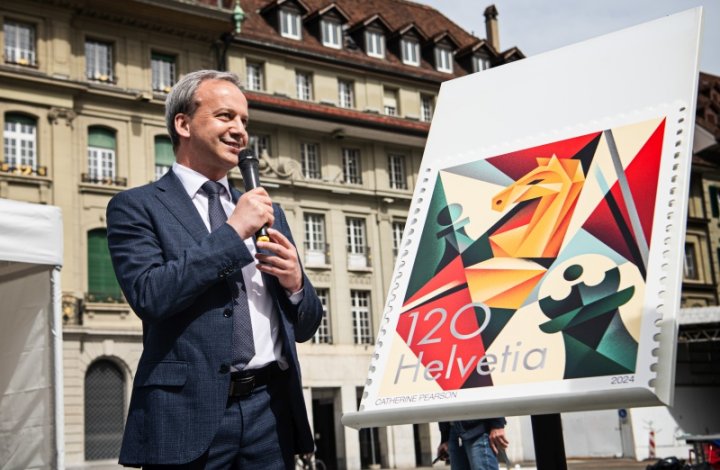
In thanking the Swiss Post for the gift, FIDE President Arkady Dvorkovich recognized the value of the gesture to the entire chess community, noting that
it’s a beautiful, modern stamp – but it also shows history. FIDE and Swiss Post have the same mission: to connect people. From now on, the stamp belongs to the whole world. It’s a huge gift for the whole chess family and continues the tradition of issuing postage stamps that make chess visible to people all over the world. Thank you very much!
This is the second time Switzerland has issued a chess stamp. The first was issued in 1968 to celebrate the Lugano Olympiad.
Simultaneous and banquet
True to chess tradition, the Bern celebration featured a 32-board simultaneous, hosted by former world champion Alexandra Kosteniuk and one of Switzerland’s greatest players, Werner Hug, who was world junior champion in 1971 and Swiss champion in 1975.
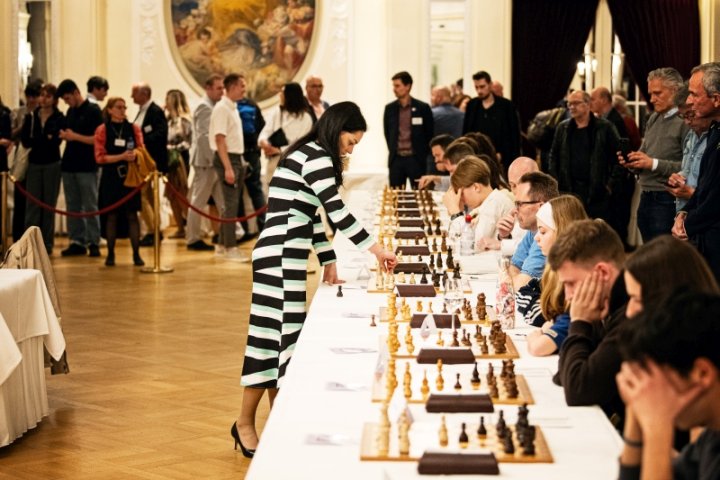
The show lasted 90 minutes and the opponents proved tough, with both Kosteniuk and Hug losing a game. This was followed by a banquet attended by FIDE and Swiss officials and distinguished guests, including former world champion Vladimir Kramnik and one of the world’s top players of the 1980s, Artur Yussupov.
During the course of the evening, Vladimir Kramnik gave a brief speech in which he shared his memories of chess in Switzerland – “It was a while ago and about twenty kilos in the month,” he recalls of the famous world championship match against Peter Leko in 2004 in the picturesque town of Brissago, Ticino.
Chess the Swiss way: 50 years of chess for youngsters and beyond
Chess is recognized as a sport in Switzerland and, in recent years, its visibility has increased thanks to the FSE, currently headed by André Vögtlin – an economist by profession – who is also a chess enthusiast. He explains:
The strategy of the Swiss Chess Federation is to increase the number of members, because we have a demographic problem. We want to flatten out the age hierarchy.
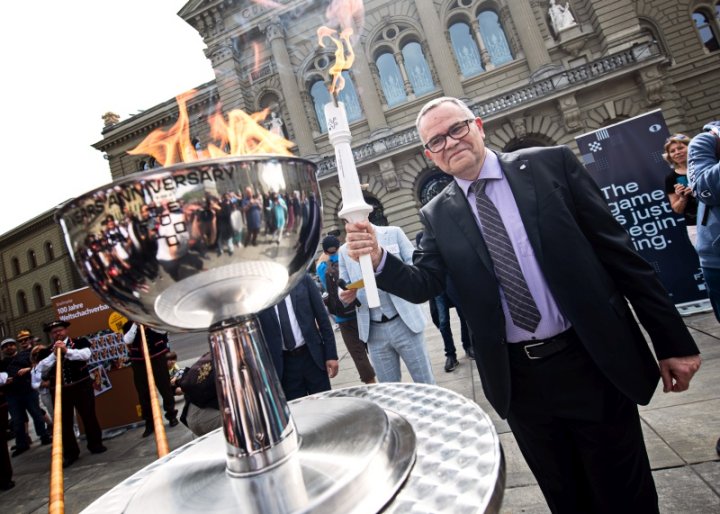
I’ve launched a project called Generation CHessand after registering a 20% improvement in two years, we renamed the project The New Generation. With this in mind, we thought we’d take part in the FIDE100 celebration by organizing a chess party. This celebration would be aimed not just at us, but at the entire chess world, chess players in Switzerland and the new generation of chess players around the world. We’ve been working on this project for a year, with the support of FIDE, and we’re delighted to have succeeded.
Vögtlin is also involved in a number of other chess initiatives, from chess for displaced children in Kenya, to FIDE’s attempt to set a Guinness World Record in chess, to the search for a better combination of soccer and chess. The FSE President concluded:
Switzerland is a good place where we can launch all these projects and do a lot of work, so I’m looking forward to the road ahead.
The President of the Swiss Olympic Committee, Jürg Stahl, presented Vögtlin with a gold wreath in recognition of his work. Stahl gave a speech in which he praised the ESF’s role in promoting chess in Switzerland.
In addition to celebrating FIDE’s centenary, the ceremony in Berne also commemorated 50 years since the founding of the Swiss Youth Chess Federation (SYCF).
Addressing the celebratory guests and chess audience at the Hotel Bellevue Palace in Berne, Michael Hochstrasser, president of the SJCF, gave a concrete example of how chess can play a role in helping today’s youth:
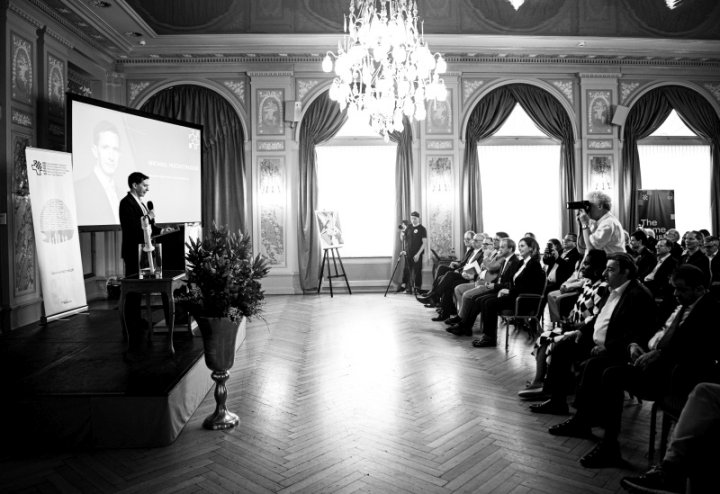
Young people are exposed to too many distractions. Multitasking is a key word of our time. At the same time, young people are doing their homework, discussing the latest events at school while listening to music and writing messages on social media. By learning chess, children learn to concentrate and fight distractions, but they can also learn to analyze their mistakes and think analytically.
Mr. Hochstrasser highlighted another aspect of chess that is relevant to today’s world and also has links to the Swiss chess tradition.
Speaking of Schwingen (or Swiss wrestling, which is considered a national sport in the country), Hochstrasser explained that the two opponents aim to throw the other person to the ground with sawdust. But this is not the case:
After the match, as a sign of friendship and peace, the winner wipes the sawdust off his opponent’s shoulders and back. In chess, we have a similar tradition: after the game, the winner and loser usually sit down together to analyze the position and exchange ideas.
He adds that today’s world can greatly benefit from this practice, by encouraging opponents to talk to each other even after the game, as fierce as it was.
More chess in Bern
Alex von Graffenried, the mayor of the Swiss capital, said:
We’ve never had an event like this in Berne, or in Switzerland.
He noted that the city has “the largest number of public chess gardens in Switzerland” and plans to add more.
I’m always impressed by the way chess can bring together different generations, people and social classes. That’s exactly what we want for our city. Berne’s public chess boards are a great success and we’ll be looking to install even more, to encourage young people to play chess.
Goodbye with a tango
The celebration of FIDE’s 100th anniversary ended with a dinner at which distinguished guests from FIDE and the Swiss chess community were presented with awards in gratitude for their contributions and dedication to the advancement of chess.
FIDE President Arkady Dvorkovich thanked the organizers for their support and emphasized the importance of Switzerland as a “largely neutral country” and its value to the global chess community.
The ceremony ended with a captivating tango show, where music, laughter and the spirit of friendship blended seamlessly, echoing the essence of chess: we’re all part of the same family.
